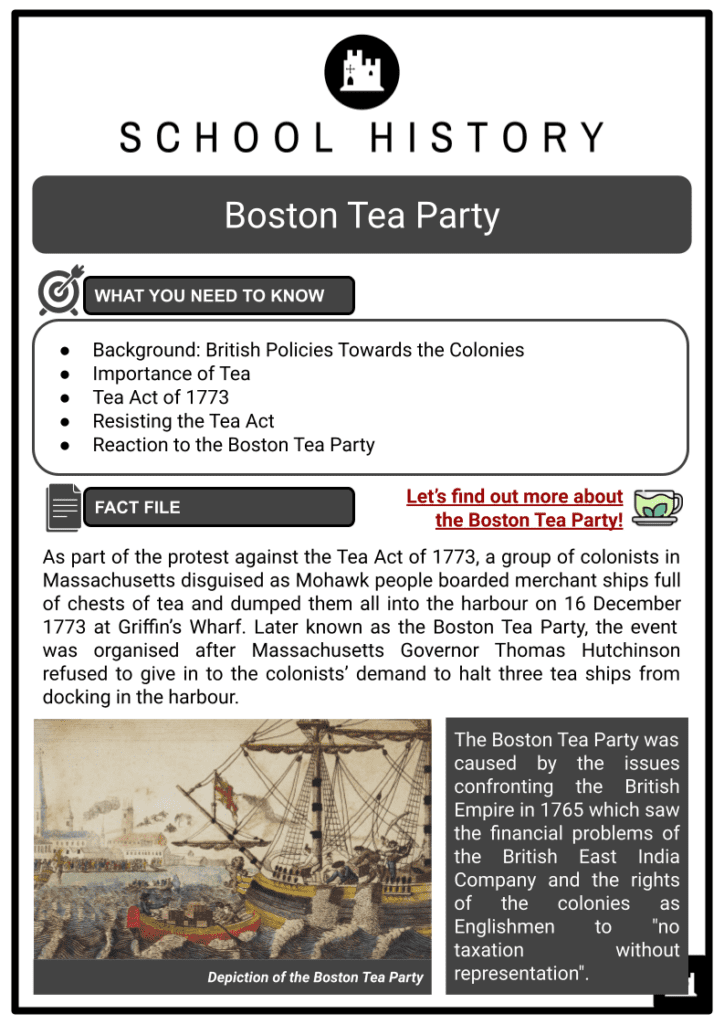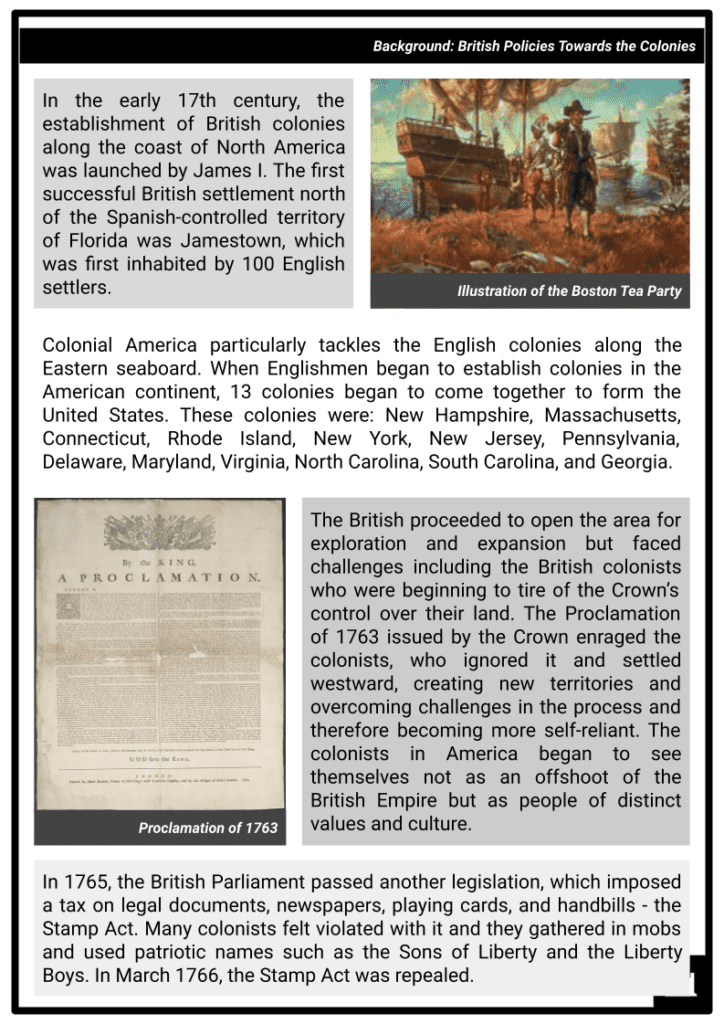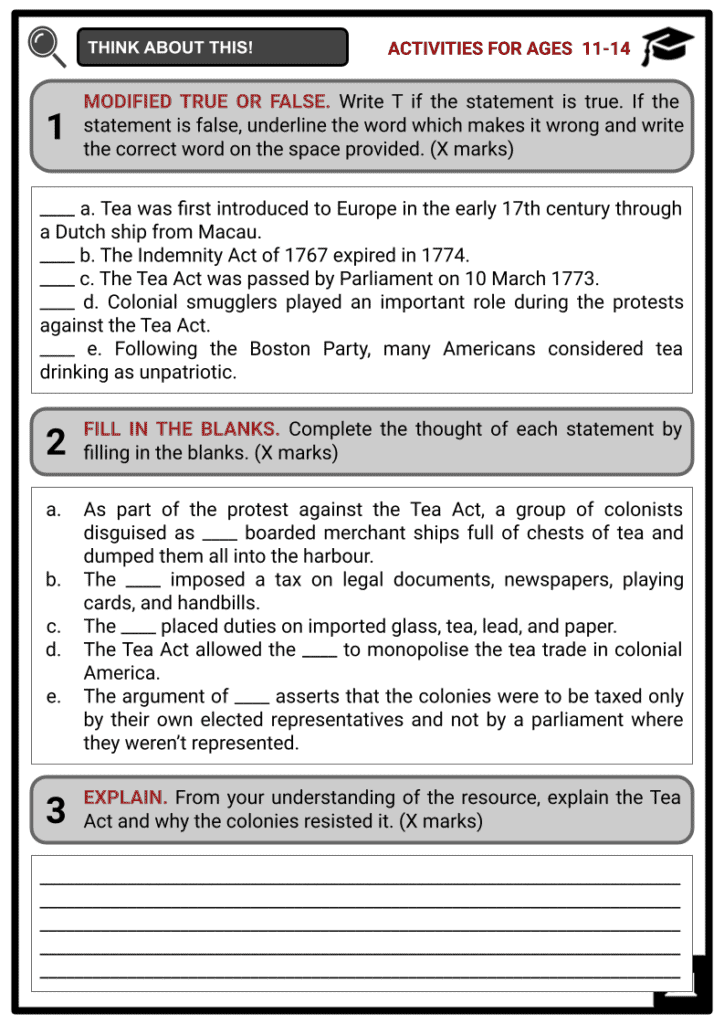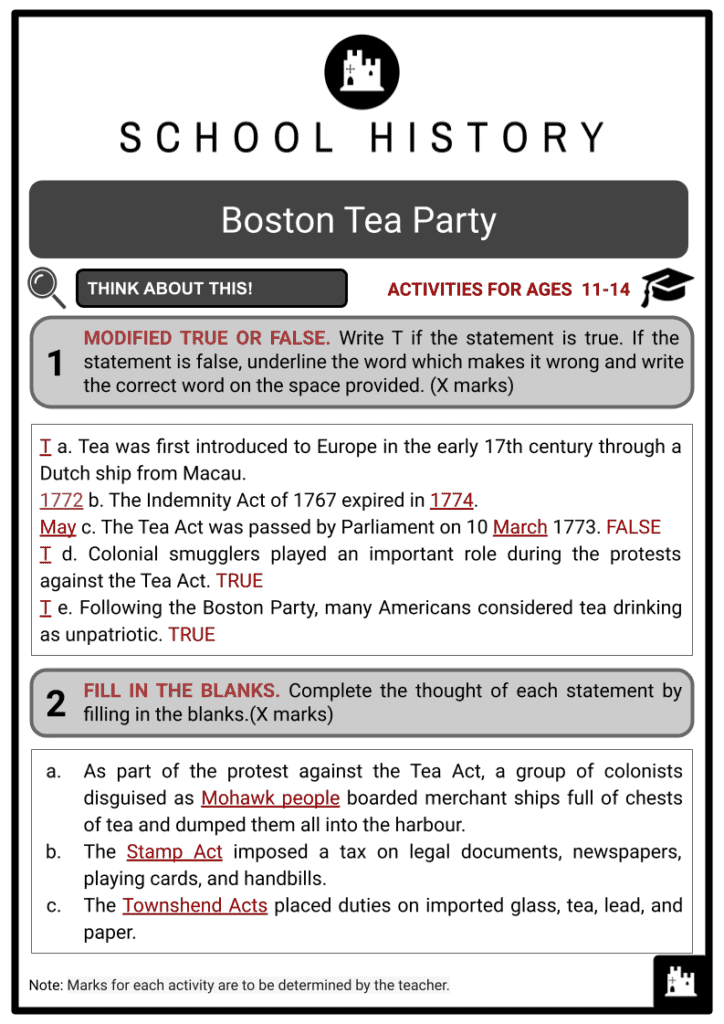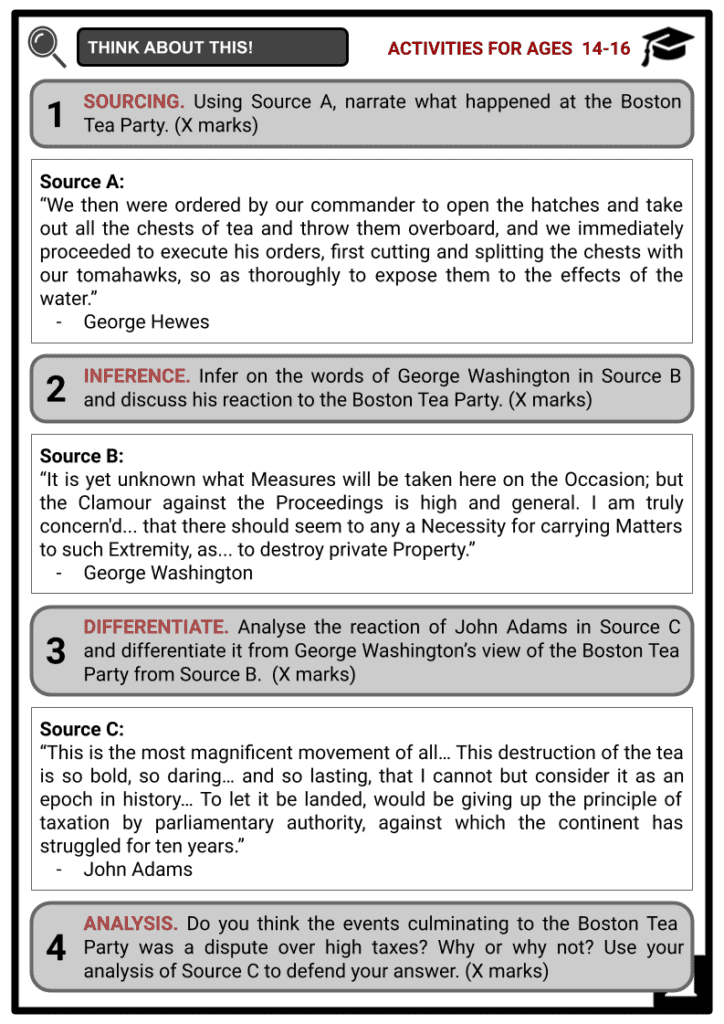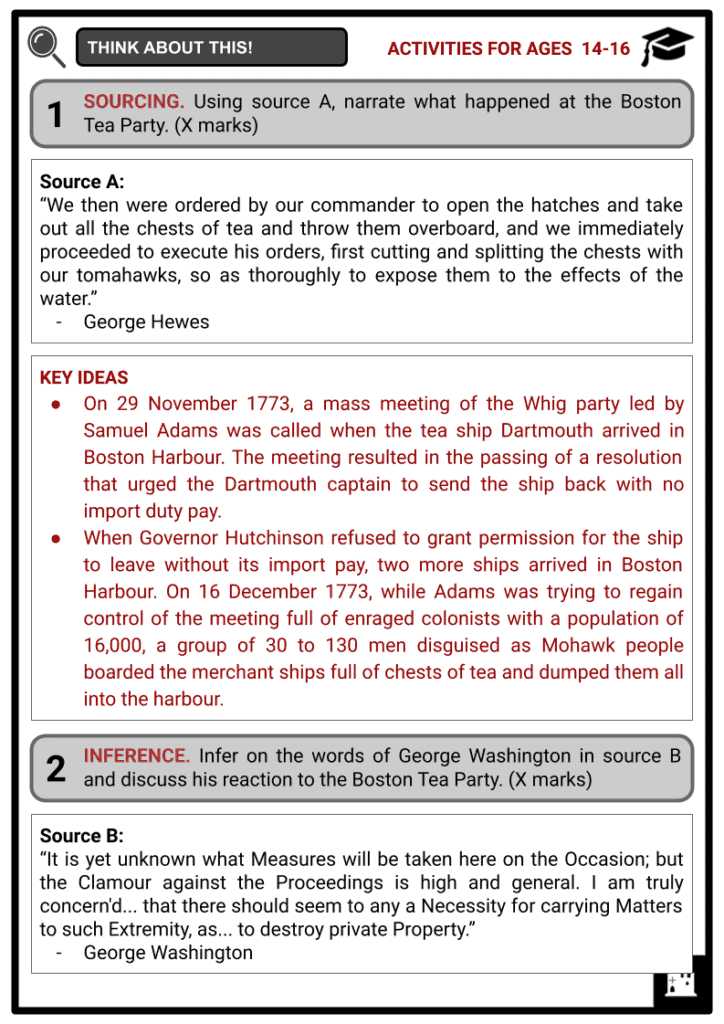Boston Tea Party Worksheets
Do you want to save dozens of hours in time? Get your evenings and weekends back? Be able to teach about the Boston Tea Party to your students?
Our worksheet bundle includes a fact file and printable worksheets and student activities. Perfect for both the classroom and homeschooling!
Summary
- Background: British Policies Towards the Colonies
- Importance of Tea
- Tea Act of 1773
- Resisting the Tea Act
- Reaction to the Boston Tea Party
Key Facts And Information
Let’s find out more about the Boston Tea Party!
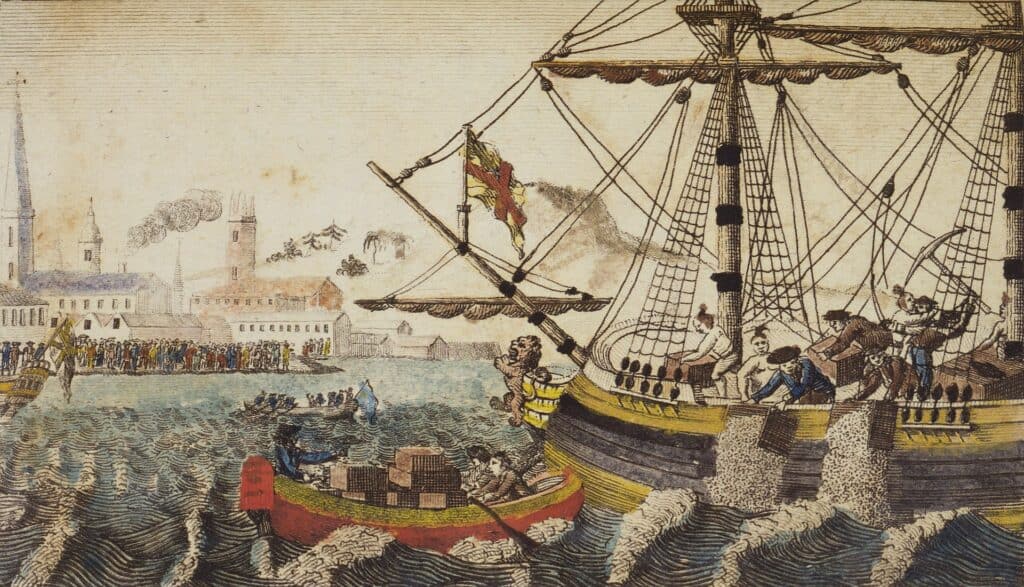
As part of the protest against the Tea Act of 1773, a group of colonists in Massachusetts disguised as Mohawk people boarded merchant ships full of chests of tea and dumped them all into the harbour on 16 December 1773 at Griffin’s Wharf. Later known as the Boston Tea Party, the event was organised after Massachusetts Governor Thomas Hutchinson refused to give in to the colonists’ demand to halt three tea ships from docking in the harbour. The Boston Tea Party was caused by the issues confronting the British Empire in 1765 which saw the financial problems of the British East India Company and the rights of the colonies as Englishmen to "no taxation without representation".
Background: British Policies Towards the Colonies
- In the early 17th century, the establishment of British colonies along the coast of North America was launched by James I. The first successful British settlement north of the Spanish-controlled territory of Florida was Jamestown, which was first inhabited by 100 English settlers.
- Colonial America particularly tackles the English colonies along the Eastern seaboard. When Englishmen began to establish colonies in the American continent, 13 colonies began to come together to form the United States. These colonies were: New Hampshire, Massachusetts, Connecticut, Rhode Island, New York, New Jersey, Pennsylvania, Delaware, Maryland, Virginia, North Carolina, South Carolina, and Georgia.
- The British proceeded to open the area for exploration and expansion but faced challenges including the British colonists who were beginning to tire of the Crown’s control over their land. The Proclamation of 1763 issued by the Crown enraged the colonists, who ignored it and settled westward, creating new territories and overcoming challenges in the process and therefore becoming more self-reliant. The colonists in America began to see themselves not as an offshoot of the British Empire but as people of distinct values and culture.
- In 1765, the British Parliament passed another legislation, which imposed a tax on legal documents, newspapers, playing cards, and handbills - the Stamp Act. Many colonists felt violated with it and they gathered in mobs and used patriotic names such as the Sons of Liberty and the Liberty Boys. In March 1766, the Stamp Act was repealed.
- However, the Parliament passed the Declaratory Act (also known as the American Colonies Act), which affirmed the right of the Parliament to pass and impose laws on the colonies.
- In 1767, the Townshend Acts (named after its sponsor Charles Townsend), which placed duties on imported glass, tea, lead, and paper, was passed. In order to control smuggling, the act was enforced with blank search warrants and writs of assistance. Like their protests against the Stamp Act, the Sons of Liberty also spread its beliefs against the Townshend Acts.
Importance of Tea
- Tea was first introduced to Europe in the early 17th century through a Dutch ship from Macau. It was initially used as an exotic medicine in England and quickly became a staple English drink. From 1700 until 1750, English consumption of tea increased by 200 percent. With the rising price of tea imported from China, the British began to grow its own tea through its colonies in the Americas and later in India.
- With the growing demand for tea in England, ruling monarch Charles II passed several acts which restricted selling of tea in private houses. By 1676, tea was taxed and coffee houses were required to apply for a licence. The government’s attempts to control profit from tea through taxation gave way to a new industry of tea smuggling.
- When the Indemnity Act of 1767, which reduced taxes on the British East India Company when they imported tea into England, expired in 1772, Parliament passed a new act that effectively left a 10% duty on tea imported into Britain and restored tea taxes that had been repealed in 1767. This new tax burden made British tea very expensive causing sales to plummet. Although the company still continued to import tea, no one would buy due to its high cost.
- A possible solution was to eliminate some of the taxes and the company initially requested to repeal the Townshend duty. However, the Parliament was unwilling to revoke it as such an action could put them in a position that went against its right to tax the colonies. In addition, the tax from the Townshend duty was used to pay the salaries of judges and governors.
- Another solution was to reduce the huge surplus of tea for a cheap price in Europe. Despite its intentions, it was determined that doing so would simply allow the tea to be smuggled back into Britain. The Parliament saw that the best market for the company’s tea was the American colonies; hence, the creation of the Tea Act on 10 May 1773.
- With the East India Company in a huge financial crisis on the verge of bankruptcy, the Tea Act was enacted to help it get back up. The Act allowed the company to monopolise the tea trade in colonial America by lowering the tax, thus, addressing smuggled tea from the Dutch.
Resisting the Tea Act
- The enactment of the Tea Act led seven ships carrying East India Company tea to be sent to the colonies from September to October of 1773. More than 600,000 pounds of tea were inside the ships. When the American colonies learned the details of the Act, they were enraged and led a campaign to raise awareness. This protest movement culminated with the Boston Tea Party.
- The Boston Tea Party was caused by the issues confronting the British Empire in 1765 which saw the financial problems of the British East India Company and the rights of the colonies as Englishmen to "no taxation without representation". It is to note that this event was not a dispute over high taxes, but rather, over the extent of Parliament’s authority in the colonies and the argument of “no taxation without representation” which asserts that the colonies were to be taxed only by their own elected representatives and not by a parliament where they weren’t represented.
- Colonial smugglers played an important role during the protests since the Tea Act threatened them out of business for making legally imported tea cheaper. Those who were not named as consignees by the East India Company but were legitimate importers of tea were also threatened by the Tea Act. With the company given monopoly on the tea trade through the Act, more colonial merchants joined the protest movement.
- On 29 November 1773, a mass meeting of the Whig party led by Samuel Adams was called when the tea ship Dartmouth arrived in Boston Harbour. The meeting resulted in the passing of a resolution that urged the Dartmouth captain to send the ship back with no import duty pay. Twenty-five men from the meeting were also asked to watch the ship and prevent it from unloading its cargo tea.
- When Governor Thomas Hutchinson of Massachusetts refused to grant permission for the ship to leave without its import pay, two more ships arrived in Boston Harbour. On 16 December, while Adams was trying to regain control of the meeting full of enraged colonists with a population of 16,000, a group of 30 to 130 men disguised as Mohawk people boarded the merchant ships full of chests of tea and dumped them all into the harbour at Griffin’s Wharf. The property damage amounted to 92,000 pounds of tea destroyed costing over $1,700,000 in today's money.
- When the tea ship William intended for Boston arrived and tea was taxed and sold to private properties, the Sons of Liberty entered its warehouse and destroyed all the tea they could find. Although some tea was already being sold at Davison, Newman and Co, this too was rummaged by the angry colonists. The last remaining tea was dumped into the harbour on 7 March 1774.
Reaction to the Boston Tea Party
- Adams made the events of the Boston Tea Party public and defended it by arguing that it was a principled protest and the only way to defend the colonists’ rights. In Great Britain, the parties that were initially friends of the colonies were now united against them.
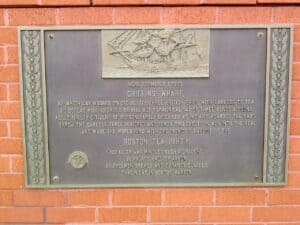
A plague about the Boston Tea Party - In response to the destruction of millions of dollars worth of British tea, the Intolerable Acts, also known as Coercive Acts, was passed in 1774. The Acts consisted of the following:
- Quebec Act
- The act extended British territory in Canada to the south of Ohio Valley. Moreover, it also welcomed and recognised Catholicism in Quebec, which angered the American colonists who were predominantly Protestants.
- Administration of Justice Act
- The governor was given power to move capital trials against government officials to Great Britain. Many colonists felt it was a way for officials to escape being tried for their crimes.
- Boston Port Act
- As a direct punishment, the Boston port was closed to all ships until proper payment was made by the colonists.
- Massachusetts Government Act
- After the incident, a new governor was appointed to oversee the colony. Unlike other colonies, the power of the colonists in Massachusetts was taken away, as officials were directly appointed instead of elected. Moreover, it directed that town meetings could only be held once a year.
- Quartering Act
- Through this act, colonies were required to provide barracks for British soldiers. In the absence of barracks, they could occupy hotels, houses, and barns.
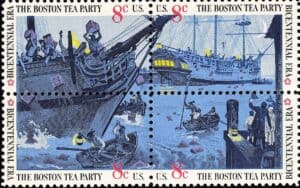
A stamp showing the Boston Tea Party
- Through this act, colonies were required to provide barracks for British soldiers. In the absence of barracks, they could occupy hotels, houses, and barns.
- Many colonists believed that the Intolerable Acts took away some of their basic freedoms. However, such punishment from the British government also united the colonies in their sentiments, which later led to the American Revolutionary War.
- Following the Boston Party, many Americans considered tea drinking as unpatriotic and shifted their preference to coffee as a hot drink. The term Boston Tea Party, however, was not used until 1834 and the event was only referred to as the destruction of tea. This was because several were reluctant to celebrate the destruction of property. After the term was formed, many political protests and activists referenced it like that time when Mohandas Gandhi burned Indian registration cards in South Africa in 1908.
Image Sources
- https://upload.wikimedia.org/wikipedia/commons/thumb/e/e6/Boston_Tea_Party_w.jpg/1920px-Boston_Tea_Party_w.jpg
- https://upload.wikimedia.org/wikipedia/commons/thumb/c/ce/Boston_Tea_Party_Plaque_-_Independence_Wharf_2009.jpg/1280px-Boston_Tea_Party_Plaque_-_Independence_Wharf_2009.jpg
- https://upload.wikimedia.org/wikipedia/commons/thumb/4/48/Boston_Tea_Party-1973_issue-3c.jpg/1280px-Boston_Tea_Party-1973_issue-3c.jpg

